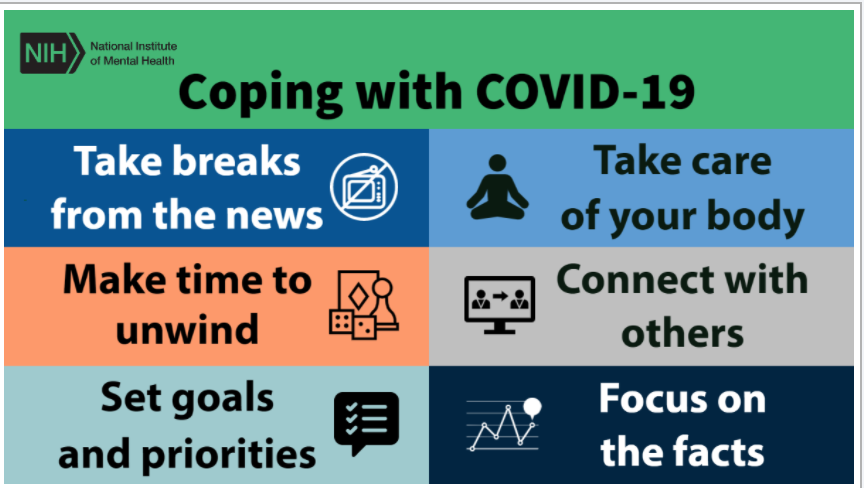It may be difficult to deal with the fear and anxiety, changes to our daily routine and a general uncertainty about COVID-19. Even though people react differently to stressful situations, there are some things you can do in order to manage stress.
First things first: It is completely normal to react with different emotions to the stress of the pandemic. Identifying and accepting our emotions is the first step towards healthy coping. It is also important to remember that emotional states are accompanied by physical reactions. For instance, fear is often felt as “butterflies in your stomach,” anger may be accompanied by rapid heart rate, fast breathing, and hot flushes in the face or the whole body, etc. Take a moment to focus on your body and identify these different physical sensations. Some of the emotional states we experience in times of pandemic may be:
- Fear
- Anxiety
- Feeling lonely
- Feeling helpless
- Frustration or Anger
- Feeling overwhelmed
- Etc.
Lack of activity and disconnection are key factors that contribute to emotional distress. Make sure you stay active according to your physical ability. If you can, take walks around the neighborhood or take nature walks. Don’t spend long periods seated or inactive. Try to sprinkle moments of activity throughout the day, inside or outside of the house. Housework or yardwork are a great way to be active! While you engage in physical activity, try to make it pleasurable – unplug from the news and social media!
In regards to social connection, try to maintain contact with others even if it’s not in person – to avoid risk of contagion. It is key to maintain social connection with family and friends, even if it is by phone, Skype, Facetime, Zoom, WhatsApp… Social connection promotes emotional wellbeing. If you feel lonely and disconnected, you can also try online support groups available through nationally recognized organizations, such as the National Association on Mental Illness (NAMI) www.nami.org
NAMI has published an excellent guide with information and resources on COVID19 that you can access here: https://nami.org/Support-Education/NAMI-HelpLine/COVID-19-Information-and-Resources/COVID-19-Guide.pdf
This graph presents some useful suggestions about how to cope with the stress caused by the pandemic:

There are also numerous apps and YouTube videos with yoga exercises, guided meditations, and breathing exercises to help manage stress. These are excellent activities that help us regulate emotions, improve physical wellbeing and even sleep better.
And remember: While we can’t control the pandemic, there are many little things in our lives that we can manage and depend on our initiative. By improving the present moment, we enhance our mood and strengthen emotionally.
For more information on COVID-19, visit the Center for Disease Control & Prevention website http://cdc.gov/COVID19
